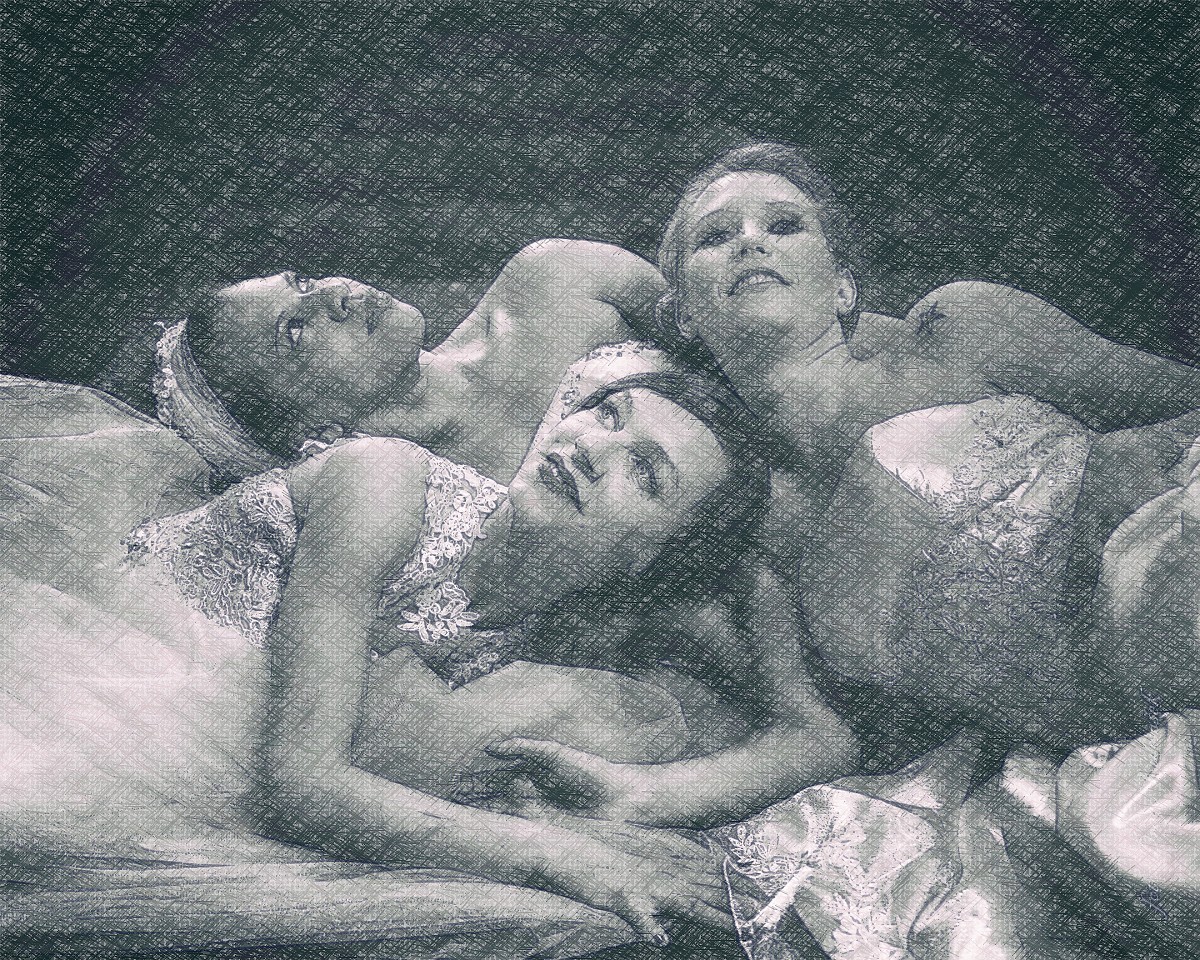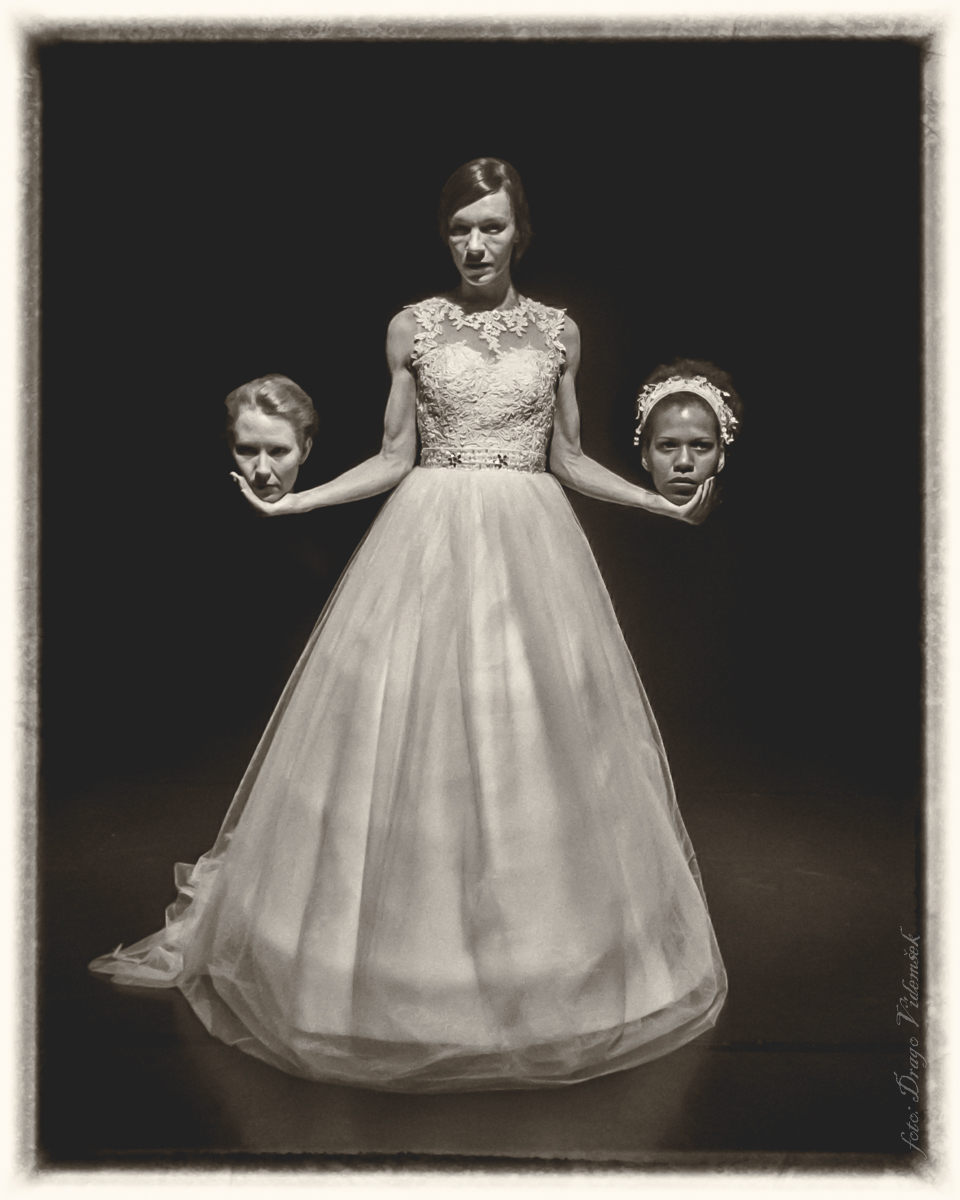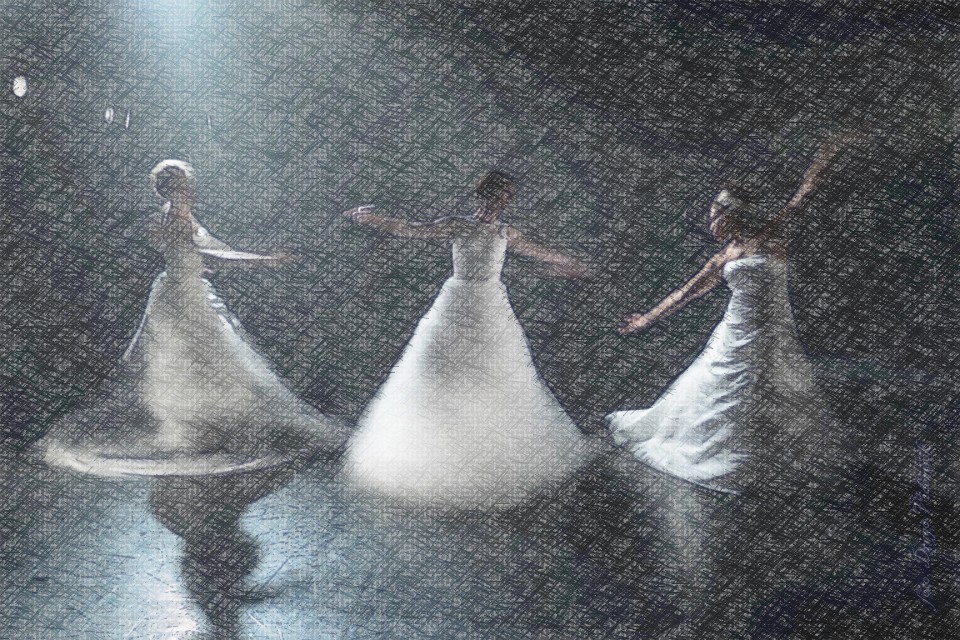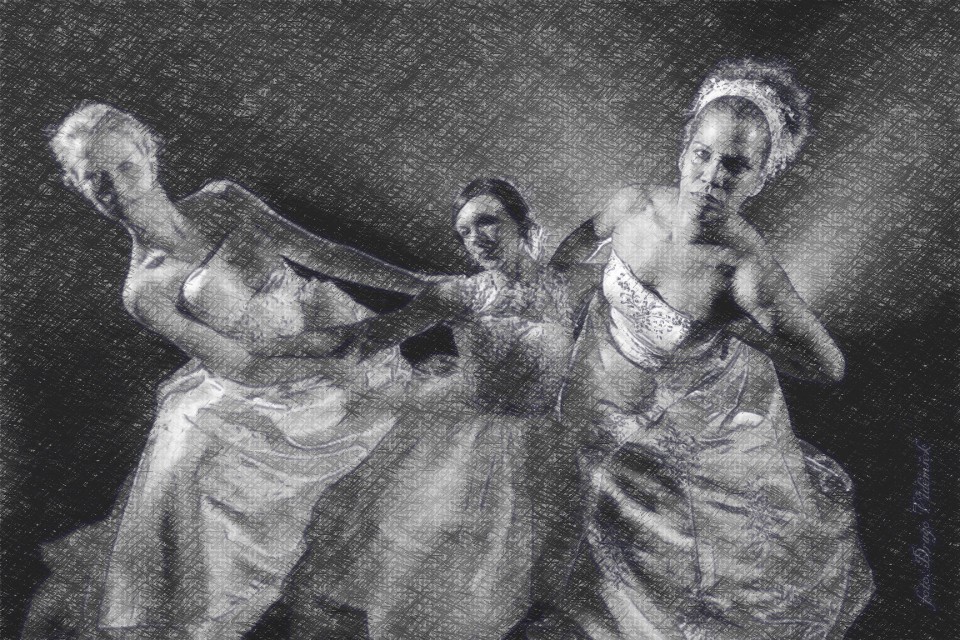Rosana Hribar / Nick Upper
TOBELIJA / TOBELIA – PREMIERA PTL / PREMIERE PTL
plesna predstava po motivih drame Ljubomirja Đurkovića / a dance performance based on the motifs of a drama by Ljubomir Đurković
Koreografija in izbor glasbe / Choreography and Music Selection: Rosana Hribar
Izvajalke in soustvarjalke giba / Performers and Co-creators of Movement: Rosana Hribar, Maša Kagao Knez, Urša Rupnik
Režija in scenografija / Direction and Set Design: Nick Upper
Dramaturgija / Dramaturgy: Andreja Kopač
Oblikovanje luči / Lighting Design: Aljaž Zaletel
Glasba / Music: Bocet la Înmormântare Stupca (Ciprian Porumbescu) Suceava, Sabu Martinez: Sabu’s Jazz Espagnole Disc 1, TRAG: Jovano, Jovanke (instrumental) – (LIVE) Banjaluka 2013, Vasko Atanasovski, Vlatko Stefanovski, SPSCO: Jovano, Jovanke, Balkan Blues (Varius Artists), Disc 1: Vasile Pandelescu: Dela Hulbesti (Si Voce), Çiğdem Taştan: Jovano, Jovanke
Izdelava kustumov / Costume Make: Katarina Škaper
Producentka / Producer: Živa Brecelj
Produkcija / Produced by: Plesni Teater Ljubljana
Koprodukcija / Co-produced by: Studio 25
Zahvala / Thanks to: Poročna Obleka d.o.o., Vasko Atanasovski
INFO. / REZ.: 041-707-475, ptl@mail.ljudmila.org, info@ptl-lj.si, Moje karte
Vstopnice / Tickets: 12/8€ (dijaki, študenti, upokojenci / scholars, students, seniors), predhodna rezervacija ali uro pred predstavo v gledališču / prior reservation or an hour before the performance at the theatre
Program Plesnega Teatra Ljubljana sofinancirata Ministrstvo za kulturo RS in Mestna občina Ljubljana, Oddelek za kulturo / The programme of PTL - Dance Theatre Ljubljana is subsidized by the Ministry of Culture RS and Municipality of Ljubljana, Department for Culture
Foto / Photo: Drago Videmšek
Osebe:
VIDA – mati
ANA – hči
BOJANA - snaha
VIDA: Poslušaj, Ana, srčece! To moraš slišati! Neverjetno.
ANA: Spet kakšen rop? Umor?
VIDA: Čudno, tu pri nas, pa nisem nič vedela o tem. In potem pride neki etnolog iz Nizozemske razkrivat naše običaje... Te tobelije, ženske-moški... »Tobelije so dekleta v družinah brez moških potomcev, ki svojim staršem obljubijo, da se ne bodo poročile. Prevzamejo mesto in vlogo neobstoječega sina in obljubijo, da bodo skrbele za starše.« Tudi ti nisi nič vedela o tem?
ANA: Ne.
VIDA: »Dekle, ki se tako zaobljubi, dobi spoštljiv položaj med moškimi. Oblači se kot moški, vede se kot moški, nosi orožje in sodeluje v bojih. Čisto tako kot moški, glava družine, pater familias.« Tako je bilo to včasih, Ana. Včasih so poznali red.
Izsek iz drame TOBELIJA Ljubomirja Đurkovića / Prevod: Lili Podpara
Characters:
VIDA – mother
ANA – daughter
BOJANA – daughter in law
VIDA: Listen, Ana, sweetie! You have to hear this! Incredible.
ANA: Robbery again? Murder?
VIDA: Strange, right here, and I knew nothing about it. And then some Dutch ethnologist comes and tells us all about our customs … These tobelias, women‑men … “Tobelias are girls in families without male descendants, who promise their parents not to marry. They take over the position and role of a non-existent son, and promise to take care of their parents.” You knew nothing about this either?
ANA: No.
VIDA: “A girl who wows to become tobelia gains a respectable position among men. She dresses like a man, behaves like a man, carries a weapon and participates in combats. Just the same as a man, the head of the family, pater familias.” This is how it once was, my dear. Back in the day, they knew what order was.
Excerpt from the drama TOBELIJA by Ljubomir Djurković / Translation: Lili Potpara
O ženskah, ki so preveč ljubile [istega] moškega, ki ga več ni …
Starodavni običaj tobelij, žensk, ki v visoko patriarhalni [balkanski] družbi prevzamejo moško funkcijo, ko iz različnih razlogov ni več moških, so si kot motiv predstave vzele koreografinja Rosana Hribar in soustvarjalki Urša Rupnik in Maša Kagao Knez, ki so črpale iz emocije »življenja brez moškega«, ki pripada tako nekdanjemu kot sedanjemu času.
Zgodba, prepletena z izgubo ljubljene osebe, se lahko danes dogaja kjerkoli; gre za urbano tragedijo o treh ženskah dveh generacij, usodno zaznamovanih s tragično izgubo ljubljenega; bodisi sina (Vida: Rosana Hribar), bodisi brata (Ana: Urša Rupnik) bodisi moža (Bojana: Maša Kagao Knez), ki so poslej obsojene na življenje druga z drugo in z odsotnim moškim, s katerim je [bila] vsaka intimno povezana.
Plesna predstava Tobelija gradi na večnih motivih, ki se pojavljajo na eni strani v želji in hrepenenju »pripadati« in po drugi strani v ujetosti v okolje, brezizhodni situaciji, strasti in jezi, žalovanju in hrepenenju, zaničevanju in usodni prepletenosti ter obsojenosti na večno vračanje v preteklost. Moški je umrl. Ostal je grob in občutek izgube, zapostavljenosti in grenkobe, ki ga hrani predvsem strah pred vsem, kar preizprašuje trdna prepričanja.
Tobelija je podoba sveta, v katerem se naglo spreminjajo vrednote in ideali, medtem ko vprašanje ženske emancipacije postaja vse bolj aktualno tako v luči izgubljanja (že) priborjenih pravic žensk kot spreminjajoče se identitete (odsotnih) moških. Tobelija je vzvratno ogledalo razbitih identitet človeštva in slika o uničujoči patriarhalnosti sveta.
About women who overly loved the [same] man who is gone …
Choreographer Rosana Hribar and the co‑creators, Urša Rupnik and Maša Kagao Knez, explored the motif of the ancient custom of tobelias, women in a highly patriarchal [Balkan] society who, once the men were gone for various reasons, assumed their role. They drew on the emotion of “life without a man”, which belongs to both the present and the past.
A story intertwined with a loss of a loved one could be happening anywhere today; it is an urban tragedy about three women across two generations, marked by the tragic loss of their loved one – either son (Vida: Rosana Hribar), brother (Ana: Urša Rupnik), or husband (Bojana: Maša Kagao Knez) – who are thereafter destined to live with one another and the absent man, with whom each of them had been intimately connected.
The dance performance Tobelia is based on timeless motifs that appear in the wish and desire “to belong” on the one hand, and in the entrapment in the environment, hopeless situation, passion and anger, mourning and yearning, contempt and fateful intertwining, and condemnation to eternal returning to the past on the other. The man had died. What remains is the grave and a sense of loss, neglect, and bitterness, fueled mainly by fear of everything that questions firm beliefs.
Tobelia is an image of the world in which values and ideals are changing rapidly, while the question of women’s emancipation is becoming increasingly important – both in light of the loss of the rights (already) acquired, and the changing identity of the (absent) men. Tobelia is a rearview mirror of the broken identities of humanity, an image of the devastating patriarchy of the world.
O avtorjih
ROSANA HRIBAR
Koreografinja, plesalka, pedagoginja
Rosana Hribar je ena najvidnejših predstavnic generacije sodobnih plesalcev iz zgodnjih sedemdesetih let prejšnjega stoletja. Šolanje je zaključila na Akademiji za ples v Ljubljani in magistrirala iz umetnosti giba na ljubljanski Akademiji za gledališče, radio, film in televizijo v Ljubljani. V zadnjih dveh desetletjih je kot plesalka in koreografinja sodelovala s skoraj vsemi najpomembnejšimi slovenskimi koreografi, z mnogimi gledališkimi režiserji ter s sodobno plesnimi in baletnimi skupinami doma in v tujini. Za svoje avtorsko delo je prejela najvišjo nagrado za izjemne umetniške dosežke mesta Ljubljane, Župančičevo nagrado ter najvišjo državno nagrado, nagrado Prešernovega sklada 2015. V zadnjih letih še posebej izstopajo serije spektakularnega trans-žanrskega pas de deux, ki sta jih v tandemu s koreografom in plesalcem Gregorjem Luštkom izpopolnila v edinstven plesni organizem. Nagrade na nekaterih najuglednejših mednarodnih plesnih tekmovanjih so afirmirale njuno plesno dovršenost, ki jo plesalca v Ljubljani gradita in vzdržujeta v mednarodno neprimerljivih pogojih.
NIKO GORŠIČ / NICK UPPER (režiserski psevdonim)
Igralec, performer, režiser in pisec
Niko Goršič je kot igralec diplomiral leta 1970 na Akademiji za gledališče, film, radio in televizijo v Ljubljani. Prispeval je k uveljavljanju mednarodnega ugleda Slovenskega mladinskega gledališča. Z gledališčem ter kot igralec in režiser je bil gost na okoli 300 festivalih v 34 državah. Ozavestil je gledališki postmodernizem na ozemlju nekdanje Jugoslavije. Že v 1970‑ih letih se je pojavljal tudi kot performer ter inoviral igralstvo z igralsko tehniko »puzzle« kot kombinacijo različnih tehnik. Leta 1999 je ustanovil Globalni teater, v okviru katerega raziskuje interakcijo dramskega gledališča in gledališča performansa. Do sedaj je sodeloval s 39 gledališkimi institucijami, odigral okoli 200 vlog in zrežiral okoli 30 predstav. Trenutno se posveča oblikovanju kulturne paralele na Balkanu in režira v Sloveniji, na Hrvaškem, v Črni Gori, Makedoniji in Bolgariji ter na Slovaškem. Je prejemnik 32 priznanj in nagrad, med katerimi jih je največ z gledališkega področja. Študiral je tudi umetnostno zgodovino in glasbo, deloval kot urednik in novinar (Mladina) ter se ukvarjal s plesno in likovno kritiko (Naši razgledi, Dnevnik, Večer, Pozorište idr.). Med drugim je ustanovitelj nagrade Zlata ptica za mlade ustvarjalce.
About the Authors
ROSANA HRIBAR
Choreographer, dancer, pedagogue
Rosana Hribar is one of the most prominent representatives of the generation of contemporary dancers born in the early 1970s, a distinguished choreographer and dancer of the dance scene in Slovenia. She graduated at the Academy for Dance in Ljubljana and obtained an MA in Art of Movement programme at the Academy of Theatre, Radio, Film and Television in Ljubljana. In the past two decades, Rosana Hribar has collaborated as a dancer and choreographer with almost all major Slovenian choreographers, many Slovenian theatre directors, and various international dance and ballet groups. She has received the highest artistic award of the City of Ljubljana, the Župančič Award, and the highest national Prešeren Fund Award of 2015. In recent years, a series of spectacular trans-genre pas de deux performances particularly stand out, which she perfected with choreographer and dancer Gregor Luštek into an unique dance organism. Their dance skills, perfected and maintained in free-lance working conditions in Ljubljana, have been confirmed by awards from some of the most prominent international dance competitions.
NIKO GORŠIČ / NICK UPPER (directorial pseudonym)
Actor, performer, director and writer
Niko Goršič graduated from acting in 1970 at the Academy of Theatre, Radio, Film and Television in Ljubljana, and contributed to the international reputation of Slovenian Youth Theatre. He visited around 300 festivals in 34 countries, both with the theatre and as an actor or director. He has raised awareness of the theatrical postmodernism in the territory of the former Yugoslavia. He has appeared as a performer already in the 1970s, and has introduced the “puzzle” technique, a combination of different acting techniques. In 1999, he founded the Global Theatre, dedicated to research of the interaction between classical and performance theatre. So far, he has collaborated with 39 theatrical institutions, played about 200 roles and directed about 30 plays. He is currently focused on the shaping of Balkan’s cultural parallel and is directing in Slovenia, Montenegro, Macedonia, Bulgaria, Slovakia and Croatia. He has received 32 awards, most of which in the field of theatre. He has also studied art history and music, worked as an editor and journalist (Mladina), and as a dance and art critic (Naši razgledi, Dnevnik, Večer, Pozorište, etc.). Among other, he is the founder of Zlata ptica / Golden Bird Award for young artists.





